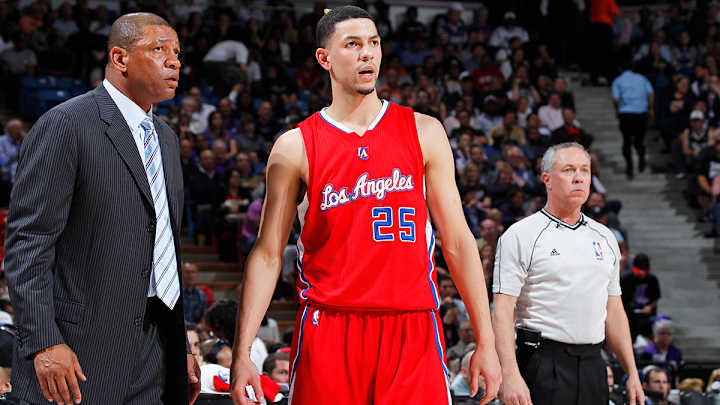Exclusive: Austin Rivers Talks Career, Haters, and Playing for Doc Rivers

In this story:
Drafted 10th overall by the New Orleans Hornets in 2012, Austin Rivers' career did not begin the way he hoped it would. A standout in high school and at Duke, Rivers was highly touted entering the draft, but never found his footing in New Orleans.
Traded to the LA Clippers in January of 2015, Rivers finally had a fresh start, but it came with one of the most unique caveats possible: He'd now become the first player in NBA history to play under his father. Joining the Clippers in 2013, Doc Rivers was still at the helm when his son Austin arrived to Los Angeles. While the two expected this to be a storyline, neither anticipated the way it would begin overshadowing Austin's career.
Serving as a solid bench piece for the Clippers to end the 2015 season, Rivers received a two-year contract extension worth $6.4M. While this deal was met with some criticism, it was the three-year $35.4M extension he signed in 2016 that truly ignited the narrative that stuck around for years.
While there was noise in 2015 that Austin Rivers was only in the NBA because of his dad, this was now the headline following his multi-year extension in 2016. As seen throughout the modern era of sports, narratives can often be impossible to reverse, even if rooted in falsehoods. This is something Austin Rivers experienced firsthand, because by the time his new extension began, he was an undeniably solid NBA player. Despite this, the narrative surrounding him was that his place in the league was being saved by his father.
In an exclusive interview with AllClippers, Austin Rivers spoke openly about dealing with the narrative that he was only in the league because of his father.
"Ya, I played for him. So naturally, for simps who don't know shit about basketball, that's what they're gonna think," Rivers said. "Seriously. There's never been any other player who did what I did, played for their dad in the NBA for any years for that matter. I'm the only one who ever did it. If anything, my journey has been harder than anybody else."
On that difference, Rivers said, "Everybody else in here got the same story, I'm the only one who has a different background. I'm the only one who has to play with their dad still lingering over them, the shadow of him being involved in the NBA. Nobody else has to deal with that shit. So anybody who has ever tried to give be any flak for having something as uncontrollable as my father's job is just insane."
One of the most popular and highly recruited players in high school basketball, and a standout at Duke, Rivers said it was the same people who supported him during that time who began slandering him with the Clippers.
"These are the same people that were cheering me on when I was in high school, at Duke, that switched up," Rivers said. "And there was people that came right back after I played with my dad and went to Houston... I've never been subjected to so much negativity when I was here in LA, then I go play in Houston two years later, and it just flipped right back again. You know what I mean?"
Now an 11-year NBA veteran, Austin Rivers has had success both under his dad and elsewhere. His 2017-18 season with the Clippers was truly fantastic, putting up 15.1 PPG on a career-high 37.8% from deep. Starting 59 games for the Clippers that season, Rivers stepped into a bigger role following the departure of Chris Paul, and helped keep that team afloat during a transformative period.
Of the 60 players selected in the 2012 NBA draft, Rivers is one of 14 still in the league. With only three of his 11 seasons coming under his father, he knows that narrative is dead.
"I've been in the NBA for 11 years, I only played three years for my dad," Rivers said. "So I'm not worried about that, man. I been proved that [narrative] wrong a long time ago. I never should've had to prove it anyway, but it's always good to have somebody saying stuff that you're not doing, it's always good to have naysayers, it's good to have people that doubt you, you need that. To play at the highest level, you should have people saying something about you. Everybody has somebody saying something about them. That was my thing, always my dad's stuff. That was my battle. Everyone's is different, that was mine. That shit's dead now."

Joey Linn is a credentialed writer covering the NBA and WNBA for On SI. Covering the LA Clippers independently in 2018, then for Fansided and 213Hoops from 2019-2021, Joey joined On SI to cover the Clippers after the 2020-21 season. Graduating from Biola University in 2022 with a Communication Studies degree, Joey served as Biola's play-by-play announcer for their basketball, baseball, softball, and soccer teams. Joey's work on Biola's broadcasts and in the classroom earned him the Outstanding Communication Studies Student of the year award in 2022. Joey covers the NBA full-time, primarily serving as a Clippers beat writer.
Follow joeylinn_